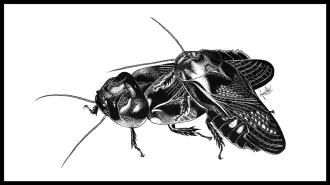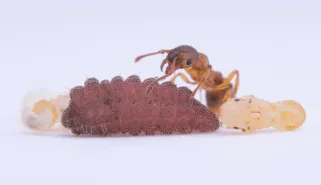If dad’s a dud among pipefish, mom may make it up to the kids with a shot of protein booster.
Female broad-nosed pipefish enhance their eggs with extra protein when researchers doom them to an undersized mate — a boost of some 11 percent higher protein than when paired with a large mate, says ecologist Gry Sagebakken of the University of Gothenburg in Sweden.
In a reversal of the mammal manner, it’s the male pipefish that carries around embryos inside his body pouch after fertilization. He supplies some of his protein to the developing offspring, and previous research shows that larger males do tend to have larger offspring. So extra protein from mom may be compensating for an undersized dad, the researchers suggest in an upcoming issue of Proceedings of the Royal Society B.
This protein enhancement represents the first evidence from an explicit test among fish to see whether females compensate for loser males, Sagebakken says.
In the study of how sexual interactions drive evolution, this egg analysis “is a nice example to illustrate how complicated sexual selection is,” comments evolutionary ecologist Elisabeth Bolund of the Max Planck Institute for Ornithology in Seewiesen, Germany.
Analyzing egg variation is important, she says, but she wants to see more experimental data on pipefish. Biologists have paid a lot of attention to how animals choose one partner instead of another, but “you need to look at all the stages in the process,” she says.
The pipefish process can look pretty strange to an observing mammal. The long, skinny fish Syngnathus typhle, which are cousins of seahorses, have a girl-kicks-girl dating scene. Females compete to insert their eggs into a pouch in the male’s body, a tricky operation that can require multiple attempts over several days. Then the female leaves the embryo-plumped male to brood the young as she swims off to look for the next partner.
Females of any species might adjust their eggs in response to a mate’s charms, or lack thereof, in two ways. In one scenario, a female with a primo male should allocate extra resources to the young and make the most of an opportunity for robust and plentiful offspring.
Research has turned up examples of this great-mate effect, but theorists have also proposed the opposite scenario. Evolution could also favor females compensating when stuck with a loser.
To see what female pipefish do, Sagebakken, Inês Braga Gonçalves, also of Gothenburg, and their colleagues brought wild pipefish temporarily into the lab. Researchers provided each of 29 females with two chances to mate, once with a puny male and once with a hunk.
After a female had transferred at least 20 eggs to a male, researchers caught him and coaxed the eggs out of his pouch for analysis. Researchers found no evidence that females were seizing their moment with robust males. Eggs in the large males’ pouches weren’t bigger or doped with extra protein or lipids.
Instead, female pipefish showed what could be a sign of the second scenario. The eggs the females deposited in small males’ pouches were not bigger or richer in fat but did have extra protein, the team reports.
That outcome makes sense in terms of the pipefish lifestyle, the researchers say, since a competitive female can easily get stuck with a substandard male. Also, once a female makes eggs, she can’t reabsorb them to get nutrients back; so at times she may mate with a male even if he’s a shrimp of a fish.






